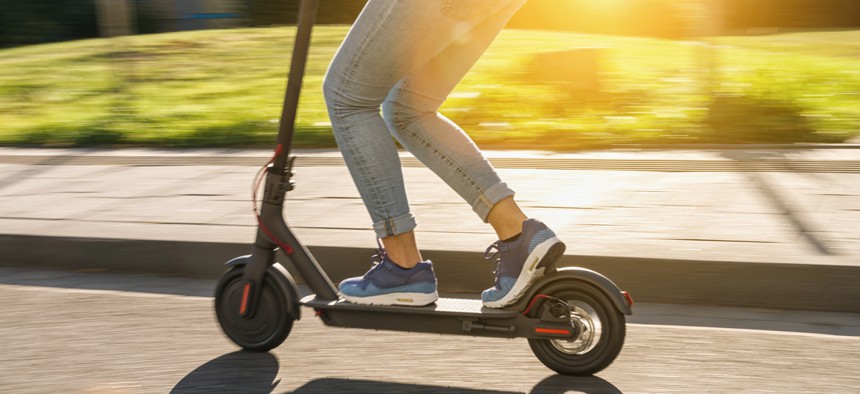Leaving Scooter Regulation to Local Government

The legislation would define scooters in the state's transportation code but leave all regulatory policy decisions to local governments. Shutterstock

Connecting state and local government leaders
A bill moving through the Georgia legislature would clarify that making the rules for electric scooters is the business of local governments.
A year after Georgia lawmakers scrapped plans for statewide regulations on electric scooters, a Senate committee is recommending an entirely different approach: leave those decisions to local governments.
The Senate Transportation Committee last week unanimously approved a bill that would define scooters in the state’s transportation law, but pose no restrictions on their use.
“We didn’t want to overregulate the industry,” state Sen. Steve Gooch, a Republican from Dahlonega, said during the committee’s hearing on the bill. “We want to encourage more development of this kind of technology.”
As written, the legislation defines an electric scooter as any device that weighs less than 100 pounds with handlebars and an electric motor, is powered by “an electric motor or human power or both,” and is capable of a maximum speed of 20 miles per hour.
That maximum, Gooch noted, is a realistic description of how fast scooters are capable of traveling, not a limit imposed by the state. Speed limits are among the controls that local governments would be able to place under the terms of the legislation, along with outright bans on electric scooters. But lawmakers, who view scooters as a viable way of helping residents bridge the gap between public transportation and work or home, said they hope cities don’t go that far.
“We believe scooters are a good solution to the first- and last-mile transit problem,” Gooch said.
Fifteen cities in Georgia already regulate electric scooters, including 12 municipalities that ban them altogether, according to a study committee report submitted to the Senate last year. Atlanta officials are currently debating new regulations and plan to release the results of a survey about e-scooters on Wednesday. After four scooter-related deaths in the city, which some have blamed on insufficient bike lanes and other infrastructure, Mayor Keisha Lance Bottoms in August ordered a nighttime ban on scooter use on city streets.
The Georgia bill is a sharp departure from efforts in last year’s legislative session to regulate scooters across the state. Legislation introduced in that session included parking restrictions and a provision that allowed users to ride scooters on bike paths, in bike lanes and on roads, among other things. But negotiations stalled with scooter companies, and lawmakers scrapped the regulations and included rules for electric bikes instead.
The new legislation, Gooch said, is a compromise that both local governments and scooter companies agree on.
“Local governments should be doing backflips and cartwheels,” he said. “They’re getting everything they asked for.”
Uber, which provides Jump scooters in addition to ride-hailing services, has said it supports the measure.
Twenty-two other states have enacted some type of legislation to regulate scooters, and dozens of others have pending proposals.
Georgia’s bill is awaiting consideration in the full Senate. If signed into law, it would take effect immediately.
Kate Elizabeth Queram is a Staff Correspondent for Route Fifty and is based in Washington, D.C.

NEXT STORY: States Move to Protect Anesthetized Women from Non-Consensual Pelvic Exams




